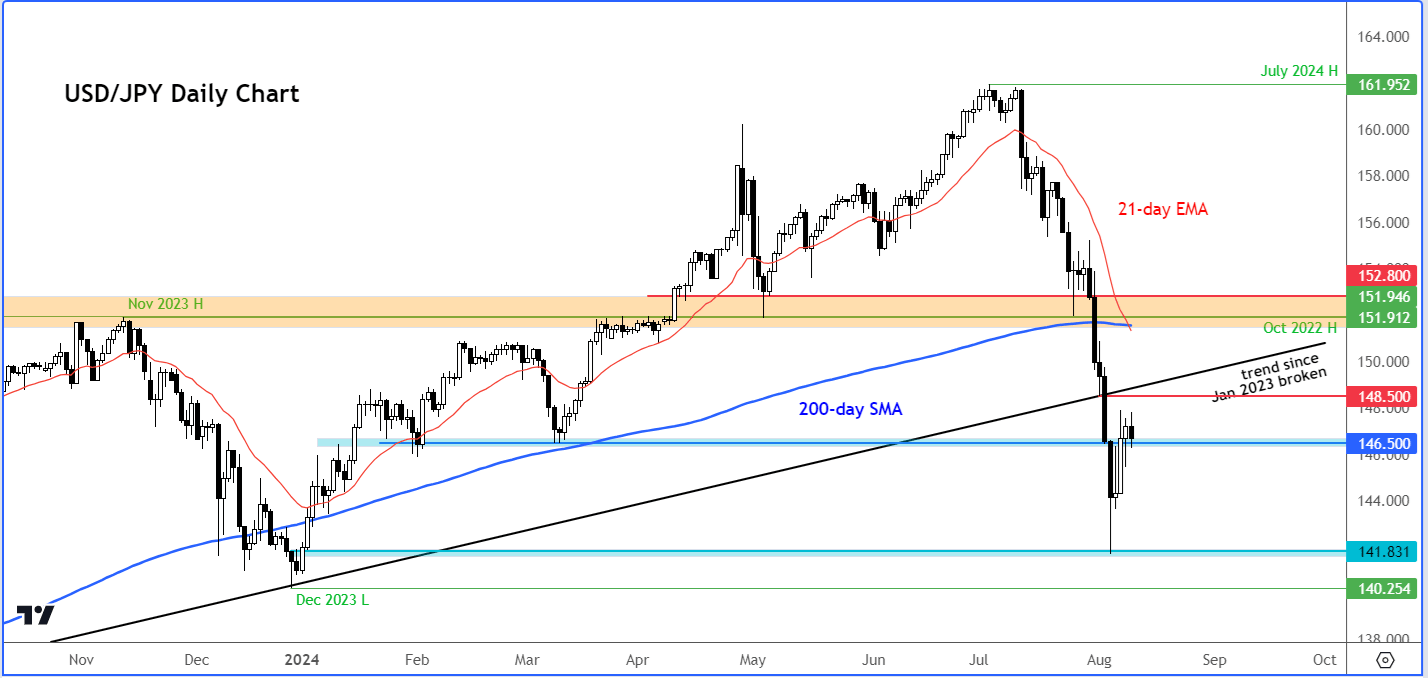
The USD/JPY managed to claw back the entire losses suffered on Monday and some, before easing back a little on Friday to turn flat on the week. The volatile week comes on the back of a 5-week decline that saw rates plunge from a high of 161.95 in July to a low so far of 141.69, before bouncing back. The two-thousand-pip drop in the space of about a month shook up the financial markets, causing a huge unwind of yen-funded carry trades. But then the stabilisation of the USD/JPY that followed Monday’s plunge helped to ease the pressure on the global stock markets, including in Japan, where the Nikkei recovered from a 12% plunge on Monday. From its high point in July, the Nikkei was down about 28% at one point on Monday, before trimming that to about 16-17% by Friday. In the early parts of the week ahead, we could well see some further stabilisation in the global markets so long as the USD/JPY doesn’t fall in the same pace we saw on Monday and Friday of the week before. The focus will then turn to key inflation data from the US, which has the potential to cause significant volatility and impact the USD/JPY forecast should we see a big deviation in data from expectations.
Can the calmness in markets persist next week?
As equity markets bounced back and conditions across asset classes stabilised, there’s been a noticeable shift in market sentiment towards pro-cyclical currencies. Initially, during the week’s turmoil—triggered by pressure on yen-funded carry trades—investors flocked to haven currencies and those with lower interest rates. However, Thursday’s stronger-than-expected jobless claims report, following an upbeat ISM services PMI on Monday and reassuring comments from Fed officials, have allayed fears of a sharp US economic slowdown.
In Japan, sentiment has also improved, thanks to comforting remarks from the Bank of Japan's Deputy Governor. This has eased the strain on yen pairs after last week’s unexpected rate hike by the BoJ, which had sent Japanese bond yields and the yen surging.
Consequently, investors have scaled back their expectations for aggressive Fed rate cuts, moving away from the earlier panic that had led to pricing in an emergency cut before the September meeting. Nonetheless, markets are still factoring in the possibility of a 50-basis-point cut in September, though in a much calmer environment as the week progressed.
USD/JPY forecast: Attention turns to US CPI and PPI
In the week ahead, all eyes will be on US inflation figures, alongside key industrial data from China and a series of economic updates from the UK and Eurozone. But the focus will be primarily on US CPI (Wednesday) and PPI (Tuesday). After the latest jobs report and ISM manufacturing PMI disappointment, all attention will be CPI figures scheduled for Wednesday. A surprising weak inflation report could deliver a big blow for the US dollar, which has lost some of its yield advantage lately. A 0.2% month-on-month for both headline and core readings are expected. If CPI turns out to be hotter, this would argue against accelerated rate cuts that the markets have priced in. Else, markets could grow in confidence with its roughly 100bp of expected cuts in 2024, putting renewed downward pressure on the USD/JPY forecast.
USD/JPY forecast: Key levels to watch
The trend on the USD/JPY has been bearish in the last five weeks or so. But following the sizeable recovery this week, we may have seen a potential low. That said, there are a few major overhead resistance levels that will need to be reclaimed to turn the tide more in the bulls favour again.

Source: TradingView.com
The USD/JPY rallied off key support around the 141.50-142.00 range, where it had previously found strong buying at the turn of the year. The recovery helped to lift rates above 146.50 resistance level, although it didn’t quite managed to show any further upside follow through. Perhaps traders are just sitting on their hands ahead of US inflation data and don’t want to be caught offside. Anyway, the 146.50 level is now an important short-term support area that needs to hold for the bulls. If it doesn’t, then I wouldn’t rule out the possibility for a revisit of the recent lows.
In terms of resistance, 148.50 is now an important resistance area to watch, for this level roughly corresponds with the underside of the broken trend line that had been in place since January 2023. A bigger resistance zone is that shaded in orange on the chart around the 151.00-152.00 area, but whether and when we will get there remains to be seen.
-- Written by Fawad Razaqzada, Market Analyst
Follow Fawad on Twitter @Trader_F_R





